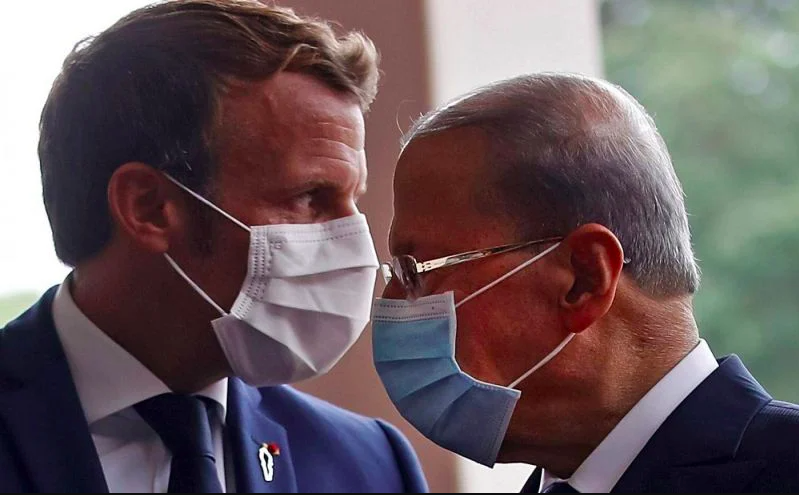
French President Emmanuel Macron and his Lebanese counterpart Michel Aoun in Baabda, September 1, 2020. (Credit: AFP)
It has already been 10 days, and French President Emmanuel Macron still has not made the call.
During his Dec. 4 visit to Jeddah, the French president had said he would “call President Aoun tomorrow” to brief him about talks he held with Saudi Crown Prince Mohammad bin Salman regarding Lebanon.
This was enough to trigger a mini-controversy on the domestic scene. Aoun’s critics perceived this lack of communication as a sign pointing at French willingness to set him aside. Such a sign is particularly embarrassing for Baabda, since Prime Minister Najib Mikati received, for his part, a lovely gift from the Elysee president: Macron managed to persuade the intransigent Saudi leader to communicate directly with the prime minister.
“Baabda has not been contacted yet, possibly because President Macron is busy. It is up to him to set up a time based on his availability,” Rafic Chelala, media advisor to Aoun, said. “Had there been any actual problem, the president would not have welcomed France’s efforts to find a way out of the diplomatic row between the Arab states and Lebanon,” he added.
The presidential palace recalled that French Ambassador to Lebanon Anne Grillo visited Baabda on Dec. 7 to converse about a range of topics, including the necessary restoration of diplomatic ties with Saudi Arabia. Based on this perspective, the phone call issue seems to be minor.
However, it confirms that Paris does not treat Mikati and Aoun equally. Mikati can pride himself on having France’s support since the day he was designated prime minister. Ostensibly, Paris believes that his cabinet is capable of setting Lebanon on the path toward the reforms that have been demanded by the international community, and that is why it is working closely with him.
Aoun, whose term expires in less than a year, is a political case that is harder for France to manage, particularly since they share a lengthy and tumultuous history, as the Lebanese general spent 15 years in exile in the Hexagon.
The forensic audit
Mikati is obviously the main person to speak to about everything related to the enactment of reforms. French diplomat Pierre Duquesne, who is in charge of coordinating international support for Lebanon, abstained from meeting with the president yesterday, as he has done in previous visits. He did, however, head to the Grand Serail for an encounter with the prime minister.
“Mr. Duquesne is in charge of a humanitarian and technical dossier, not a political one. He does not have any reason to visit the president,” said Randa Takieddine, a France-based journalist who closely follows French policy on the Lebanese file.
Theoretically, this is entirely logical. Yet, in the Lebanese context, sidelining the president on such an important matter can be seen as problematic. This is true particularly since the head of state has reiterated his willingness to assume a role in this dossier.
A number of local media outlets reported that Aoun feels sidelined by Mikati, mainly at the economic level, such as in negotiations with the International Monetary Fund. In early October, a few weeks after the formation of the Mikati cabinet, Aoun insisted on including two of his advisers (Charbel Cordahi and Rafic Haddad) in the ministerial delegation tasked with negotiating with the IMF. He even sent a missive to the Council of Ministers’ general secretariat to object to the fact that his two advisers were not involved in the negotiations.
In the same vein, Aoun more recently asked Deputy Prime Minister Saade Chami, who leads the Lebanese delegation, to provide him with the minutes of the IMF meetings. Mr. Chami replied in a TV interview, saying that “no one is preparing the minutes. This is time consuming.”
"President Aoun is not being sidelined. Dialogue channels are open with the Serail. But it is good to recall that under Constitution Article 52, the president of the Republic shall negotiate international treaties. The president would like to include the minutes of the IMF discussions in the presidential archives,” Chelala said.
The Banque du Liban forensic audit is another divisive question. The president hopes to see some key reforms implemented before leaving the presidential palace, such as this audit, to which he “is still committed without being open to any compromise,” his media advisor said.
The problem is that when it comes to this issue, the president is pitted against all the other political actors who seek to minimize it, since such an audit risks creating legal trouble for some of them. However, Paris needs to move forward on this topic and, to do so, this simple audit needs to be carried out, so Lebanon’s financial reality can be established and negotiations with the IMF can begin in earnest. By this logic, would the request made by the head of state, which is driven by political considerations, obstruct the process? L’Orient-Le Jour tried yesterday to get an answer from the French Embassy, but to no avail.
This article was originally published in French in L'Orient-Le Jour. Translation by Joelle El Khoury.